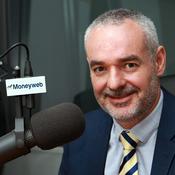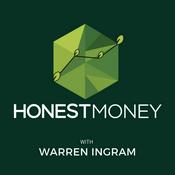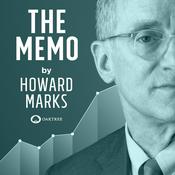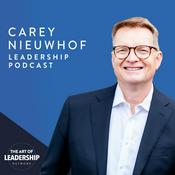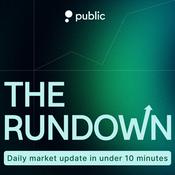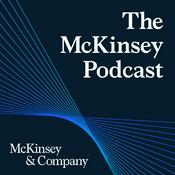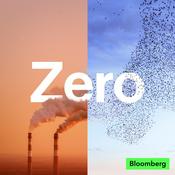418 episodes
- Every era runs on an economic story. For the last half-century, ours has been neoliberalism — the belief that if you free markets from constraints, prosperity will follow.
This week we revisit a bracing conversation with historian Gary Gerstle about how neoliberalism took hold, why it once felt inevitable, and why it’s now breaking down in plain sight. Drawing on his book The Rise and Fall of the Neoliberal Order, Gerstle joins Nick and Goldy to trace how a seductive promise of “freedom” — economic, cultural, and political — helped neoliberalism crowd out the New Deal order, even as it hollowed out communities, deepened inequality, and set the stage for today’s volatility. Along the way, they explore how economic crises create openings for new ideas, why the collapse of an old order is never smooth, and what it will take to build a post-neoliberal, middle-out economy that actually delivers for working people.
Gary Gerstle is an author, historian, and scholar of American political and economic history. He is the Paul Mellon Professor of American History Emeritus at the University of Cambridge and a Professor Emeritus of History at Vanderbilt University.
Social Media:
@glgerstle
Further reading:
Writing the History of Neoliberalism: A Comment
1984 Super Bowl APPLE MACINTOSH Ad
The Rise and Fall of the Neoliberal Order: America and the World in the Free Market Era
Website: http://pitchforkeconomics.com
Facebook: Pitchfork Economics Podcast
Bluesky: @pitchforkeconomics.bsky.social
Instagram: @pitchforkeconomics
Threads: pitchforkeconomics
TikTok: @pitchfork_econ
YouTube: @pitchforkeconomics
LinkedIn: Pitchfork Economics
Twitter: @PitchforkEcon, @NickHanauer
Substack: The Pitch Revisiting How Neoliberalism Turned the Work Ethic Against Workers (with Elizabeth Anserson)
2026/1/13 | 46 mins.Americans have been told that working harder is the path to dignity, security, and success. But what if that promise was hijacked?
This week, we’re revisiting our episode with Professor Elizabeth Anderson, where she exposes how neoliberalism weaponized the “work ethic” — transforming a moral tradition that once honored workers into a system that blames them, exploits them, and rewards extraction over contribution. Drawing from her new book Hijacked, Anderson traces how today’s economy punishes labor, glorifies predatory wealth, and rigs the rules against working people — and what it would take to take the work ethic back.
Elizabeth Anderson is the Max Mendel Shaye Professor of Public Philosophy, Politics, and Economics at University of Michigan. She is the author of Value in Ethics and Economics, The Imperative of Integration, and Private Government: How Employers Rule Our Lives (and Why We Don't Talk about It). She is a MacArthur Fellow and Fellow of the American Academy of Arts and Sciences.
Social Media:
@UMPhilosophy
Further reading:
Hijacked: How Neoliberalism Turned the Work Ethic Against Workers and How Workers Can Take It Back
Private Government: How Employers Rule Our Lives (and Why We Don't Talk about It)
Website: http://pitchforkeconomics.com
Facebook: Pitchfork Economics Podcast
Bluesky: @pitchforkeconomics.bsky.social
Instagram: @pitchforkeconomics
Threads: pitchforkeconomics
TikTok: @pitchfork_econ
YouTube: @pitchforkeconomics
LinkedIn: Pitchfork Economics
Twitter: @PitchforkEcon, @NickHanauer
Substack: The Pitch- Most people buy the fiction that markets are “natural,” inequality is inevitable, and government should step aside — but where did that idea come from?
In this episode from 2019, Nick and Goldy talk with English journalist George Monbiot and American journalist and author Binyamin Appelbaum about how neoliberalism was deliberately built and sold — not stumbled into.
They unpack how economists, funders, and institutions rewrote the rules to favor markets over people, shifted political norms, and made extreme inequality seem inevitable — and what that history means for reclaiming an economy that works for everyone.
George Monbiot is an English journalist, author, and political/environmental activist. He writes a regular column for The Guardian and has published several books on politics, ecology, and society. He’s known for critiquing corporate power, neoliberal economics, and environmental degradation.
Binyamin Appelbaum is an American journalist and author. He is a lead writer on business and economics for The New York Times editorial board. He previously covered the Federal Reserve and economic policy for the Times and has written widely on how markets and policy shape society.
Social Media:
georgemonbiot.bsky.social
bcappelbaum.bsky.social
@BCAppelbaum
Further Reading:
The Economists' Hour: False Prophets, Free Markets, and the Fracture of Society
Website: http://pitchforkeconomics.com
Facebook: Pitchfork Economics Podcast
Bluesky: @pitchforkeconomics.bsky.social
Instagram: @pitchforkeconomics
Threads: pitchforkeconomics
TikTok: @pitchfork_econ
YouTube: @pitchforkeconomics
LinkedIn: Pitchfork Economics
Twitter: @PitchforkEcon, @NickHanauer
Substack: The Pitch How Economists Cause Harm Even as They Aspire to Do Good (with George DeMartino)
2025/12/30 | 39 mins.For more than a century, economists have told us they’re simply “describing the world as it is.” But what if their theories aren’t neutral — and are quietly doing enormous harm?
This week, we’re joined by economist George DeMartino, author of The Tragic Science, who makes a devastating case that modern economics has helped legitimize policies that shattered communities, fueled inequality, and even cost millions of lives — all while claiming scientific objectivity. DeMartino exposes how orthodox economics trained itself to dismiss real suffering as abstract and acceptable — as long as the aggregate numbers looked good.
If you’ve ever wondered why economic “expertise” keeps failing working people, this conversation connects the dots.
George DeMartino is a Professor of Economics at the Josef Korbel School of International Studies at the University of Denver. He is the author of The Tragic Science: How Economists Cause Harm (Even as They Aspire to Do Good) and The Economist’s Oath. His work examines the moral obligations of economists, the profession’s history of harm—including what he calls econogenic harm—and the need for a new ethics grounded in humility, uncertainty, and democratic accountability.
Further reading:
The Tragic Science: How Economists Cause Harm (Even as They Aspire to Do Good)
The Economist’s Oath: On the Need for and Content of Professional Economic Ethics
Website: http://pitchforkeconomics.com
Facebook: Pitchfork Economics Podcast
Bluesky: @pitchforkeconomics.bsky.social
Instagram: @pitchforkeconomics
Threads: pitchforkeconomics
TikTok: @pitchfork_econ
YouTube: @pitchforkeconomics
LinkedIn: Pitchfork Economics
Twitter: @PitchforkEcon, @NickHanauer
Substack: The PitchIf America Is “Winning,” Why Does the Economy Feel Like This? (with Talmon Joseph Smith)
2025/12/23 | 40 mins.America has never been wealthier—so why does it feel so hard to get by?
New York Times economics reporter Talmon Joseph Smith joins Nick and Goldy this week to unpack the growing gap between economic headlines and the lived reality of most Americans. With nearly $200 trillion in national wealth and half the country holding just a sliver of it, they explore why GDP and aggregate growth keep telling a story working families don’t recognize—and what that disconnect means for our economy and our politics.
Talmon Joseph Smith is an economics reporter currently covering labor markets, inequality, and political economy. His recent work at The New York Times has focused on the tension between headline economic indicators and lived economic reality. His forthcoming book, Clout and Capital, examines how power, influence, and wealth shape economic outcomes in America.
Social Media:
@talsmith.bsky.social
@talmonsmith
Further reading:
America Has Never Been Wealthier. Here’s Why It Doesn’t Feel That Way.
Michael W. Green - How a Broken Benchmark Quietly Broke America
Read more from Talmon Joseph Smith
Website: http://pitchforkeconomics.com
Facebook: Pitchfork Economics Podcast
Bluesky: @pitchforkeconomics.bsky.social
Instagram: @pitchforkeconomics
Threads: pitchforkeconomics
TikTok: @pitchfork_econ
YouTube: @pitchforkeconomics
LinkedIn: Pitchfork Economics
Twitter: @PitchforkEcon, @NickHanauer
Substack: The Pitch
More Business podcasts
Trending Business podcasts
About Pitchfork Economics with Nick Hanauer
We are living through a paradigm shift from trickle-down neoliberalism to middle-out economics — a new understanding of who gets what and why. Join zillionaire class-traitor Nick Hanauer and some of the world’s leading economic and political thinkers as they explore the latest thinking on how the economy actually works.
Podcast websiteListen to Pitchfork Economics with Nick Hanauer, The Money Show and many other podcasts from around the world with the radio.net app
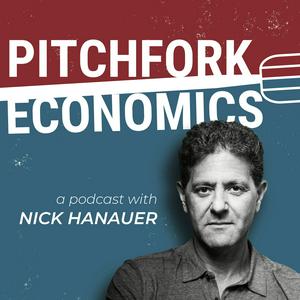
Get the free radio.net app
- Stations and podcasts to bookmark
- Stream via Wi-Fi or Bluetooth
- Supports Carplay & Android Auto
- Many other app features
Get the free radio.net app
- Stations and podcasts to bookmark
- Stream via Wi-Fi or Bluetooth
- Supports Carplay & Android Auto
- Many other app features


Pitchfork Economics with Nick Hanauer
Scan code,
download the app,
start listening.
download the app,
start listening.








